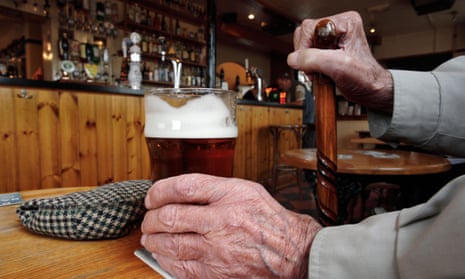Hundreds of pubs could shut for ever unless Boris Johnson decides in the next 48 hours when they can reopen, the UK’s largest beer companies have warned.
In an open letter to the prime minister, more than 50 companies said plummeting beer sales and prolonged uncertainty had brought the pub and brewing industry to “a moment of maximum jeopardy” that could cost hundreds of thousands of jobs.
The signatories – from global giants such as the Guinness owner Diageo to family brewers such as Adnam’s – urged Johnson to say by Friday whether the government would allow pubs to reopen from 4 July.
The date was initially proposed by the government as part of a phased lifting of lockdown restrictions that including permission for non-essential shops to start trading this week. But the prime minister has yet to confirm whether the plan will proceed, despite repeated calls for clarity from the industry, which claims it needs three weeks to prepare.
Quick GuideWill there be a second wave of coronavirus?
Show
In recent days the UK has seen a sudden sharp increase in Covid-19 infection numbers, leading to fears that a second wave of cases is beginning.
Epidemics of infectious diseases behave in different ways but the 1918 influenza pandemic that killed more than 50 million people is regarded as a key example of a pandemic that occurred in multiple waves, with the latter more severe than the first. It has been replicated – albeit more mildly – in subsequent flu pandemics. Until now that had been what was expected from Covid-19.
How and why multiple-wave outbreaks occur, and how subsequent waves of infection can be prevented, has become a staple of epidemiological modelling studies and pandemic preparation, which have looked at everything from social behaviour and health policy to vaccination and the buildup of community immunity, also known as herd immunity.
Is there evidence of coronavirus coming back in a second wave?
This is being watched very carefully. Without a vaccine, and with no widespread immunity to the new disease, one alarm is being sounded by the experience of Singapore, which has seen a sudden resurgence in infections despite being lauded for its early handling of the outbreak.
Although Singapore instituted a strong contact tracing system for its general population, the disease re-emerged in cramped dormitory accommodation used by thousands of foreign workers with inadequate hygiene facilities and shared canteens.
Singapore’s experience, although very specific, has demonstrated the ability of the disease to come back strongly in places where people are in close proximity and its ability to exploit any weakness in public health regimes set up to counter it.
In June 2020, Beijing suffered from a new cluster of coronavirus cases which caused authorities to re-implement restrictions that China had previously been able to lift. In the UK, the city of Leicester was unable to come out of lockdown because of the development of a new spike of coronavirus cases. Clusters also emerged in Melbourne, requiring a re-imposition of lockdown conditions.
What are experts worried about?
Conventional wisdom among scientists suggests second waves of resistant infections occur after the capacity for treatment and isolation becomes exhausted. In this case the concern is that the social and political consensus supporting lockdowns is being overtaken by public frustration and the urgent need to reopen economies.
However Linda Bauld, professor of public health at the University of Edinburgh, says “‘Second wave’ isn’t a term that we would use at the current time, as the virus hasn’t gone away, it’s in our population, it has spread to 188 countries so far, and what we are seeing now is essentially localised spikes or a localised return of a large number of cases.”
The overall threat declines when susceptibility of the population to the disease falls below a certain threshold or when widespread vaccination becomes available.
In general terms the ratio of susceptible and immune individuals in a population at the end of one wave determines the potential magnitude of a subsequent wave. The worry is that with a vaccine still many months away, and the real rate of infection only being guessed at, populations worldwide remain highly vulnerable to both resurgence and subsequent waves.
“Our businesses cannot afford to continue in limbo,” the firms, including Carlsberg, Molson Coors and Greene King, told Johnson. “The livelihoods of thousands of publicans and hundreds of thousands of pub and brewery employees in every corner of the UK hang in the balance.
“We want to work with the government to get our breweries and pubs back on their feet, but we need urgent clarity from you in order to do this.”
As well as confirmation of a reopening date, the letter – coordinated by the British Beer and Pubs Association (BBPA) – calls on the government to publish specific industry guidance that employers can use to train staff.
The BBPA said some firms had begun taking staff out of furlough to prepare, while brewers had started making beer to be ready for the return of demand.
This had led to increased costs for an industry already burning through £100m a month to sustain itself in the absence of any trade, the BBPA said.
The letter represents an escalation of pressure on the government from the beer and pubs industry, which has been devastated by three months of lockdown.
Government officials hinted this month that English beer gardens may be able to reopen on 22 June, allowing pubs with outdoor space to start racking up much-needed sales earlier than thought.
But Downing Street ditched the plan, fuelling confusion in the industry about reopening and raising fears that many of the UK’s 47,000 pubs may not survive the pandemic.
The Guardian has approached Downing Street and the Department for Business, Energy and Industrial Strategy for comment.
